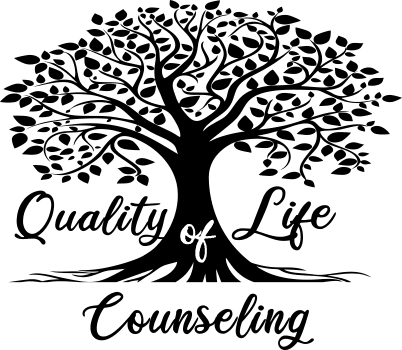Q: What makes Quality of Life Counseling different?
A: Our approach is different because:
- You interact with a PhD level psychotherapist to diagnose and treat issues. There are no other substitute counselors. You benefit from Dr. Thouin’s experience at each and every session.
- You get therapy sessions with a positive, empathetic, engaging psychotherapist.
- You get a psychotherapist who is passionate about clients’ needs, care, and long-term growth.
- You get a psychotherapist who quickly builds a rapport and connects with clients.
Q: What is addiction?
A: Addiction is a complex condition, a brain disease that is manifested by compulsive substance use or compulsive behavior despite harmful consequence. Some people are born with a brain chemistry that predisposes them to addiction. Others develop addictions over time from substance abuse. People with addiction have an intense focus on certain behaviors, or using substances such as alcohol or drugs, to the point that it takes over their life. They keep using even when they know it will cause problems. Effective treatments are available. People can recover from addiction and lead healthy, productive lives.
Q: I usually deal with things on my own. Aren’t people who go to therapy weak?
A: While there are many misconceptions and stigmas surrounding addiction, there is nothing wrong with seeking help for it. People who seek help know when they need it and have the courage to reach out. Everyone needs help now and then. Together, we will explore your strengths and determine how you can use them to reduce the influence of the problems you are facing. The recovery process can actually be a very fulfilling aspect of your life.
Q: Can you help with transitioning from a residential treatment center?
A: Yes. Treatment centers teach coping skills and establish positive behaviors; however a gap can exist when a someone transitions back into the community. Quality of Life Counseling can provide individualized, focused psychotherapy and support a return to normal daily life.
Q: What is a Co-Occurring Disorder?
A: This means that an individual has both a substance use disorder as well as a mental health disorder, such as trauma, grief, and loss. The diagnosis is called a co-occurring disorder, dual disorder or sometimes a dual diagnosis. Although I specialize in substance use disorders, I also have an extensive background in treating other mental health disorders. I will work with you to address both types of disorders during counseling sessions. See the Services page for a full list of issues that can be treated.
Q: What are the benefits of group therapy?
A: For substance abuse, group therapy can supplement individual therapy. Therapeutic groups allow people with similar issues to share with and learn from one another. They will take place in a private, safe and comfortable small group setting. The groups will have 6-8 members, and meet for one hour on Fridays for 8 weeks. The sessions will address life’s challenges, protective factors, and learning coping skills. The intent is to expand awareness on the behavioral, medical, and psychological consequences of substance abuse.
Dialogue will focus on recovery as well as the underlying issues that contribute to substance abuse such as trauma, grief & loss, mood disorders, and relationship issues. A humanistic approach utilizing cognitive behavioral therapy will help guide the group to discuss and process events, thoughts and emotions of substance abuse.
Q: Why the Quality of Life name?
A: The word quality means the standard to which something is measured against, or the degree of excellence of something. This word was selected to represent the excellent level of care you will receive. And of course, life is the existence of an individual human being. This was chosen to represent how you will be treated as a unique individual. The words “quality of life,” when put together, represent the standard of health and happiness experienced by an individual. The objective of Quality of Life Counseling is to provide exceptional, personalized care to improve the health and happiness of each and every client.
Q: Why the Olive tree logo?
A: The olive tree was selected to represent Quality of Life Counseling because it is one of the most sacred and beloved trees. It symbolizes peace, friendship, stability, and hope. Olive trees require very little nutrition, as they have grown throughout history in poor rocky soils. Olive tree roots grow deep allowing the tree to surprisingly thrive in the desert or under difficult conditions. The olive tree reminds us to act with the ideals of peace and friendship. Conflict is rarely useful, but provides an opportunity to understand a different perspective, provided we engage the other person in good faith. The olive tree also reminds us to remain strong. Mental and emotional strength can help us through even the most difficult of circumstances, so building a foundation based on strength and integrity should be a priority at all times.
Q: Why the vision to “Make positive changes – Starting today”
A: Quality of Life Counseling takes a humanistic approach to therapy with an emphasis on positive psychology. Positive psychology examines what gives clients’ lives meaning and purpose, and how they can move beyond surviving to flourishing. It explores how they can become happier and more fulfilled, cultivate what is best within themselves and enhance their experiences of work, play, and love. Counseling supports clients who desire a change in their lives, helping them come to a greater understanding of the person they are and the person they can become.
Please contact Quality of Life Counseling today to improve your quality of life!
